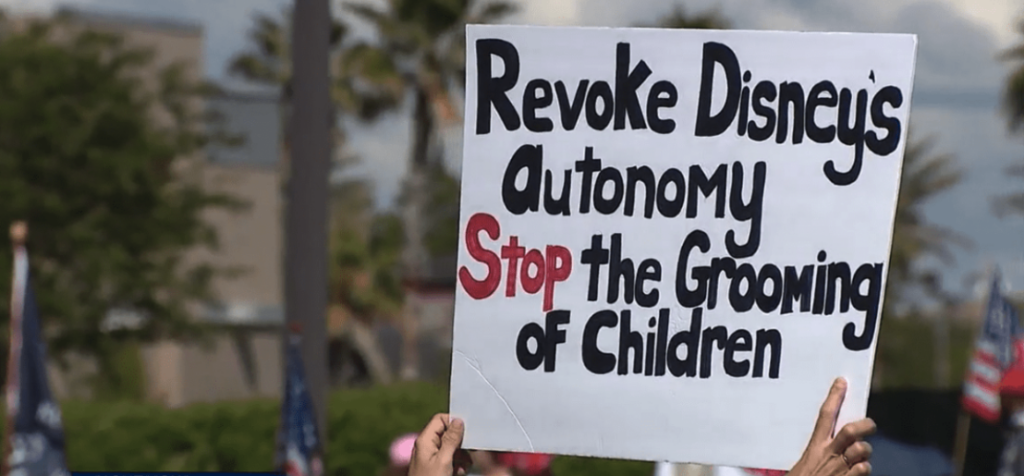Florida’s “Parental Rights in Education” law—commonly called the “Don’t Say Gay” bill by critics—is a cultural bombshell. Most of the focus from the Left is contained within the moniker attached to it—the policing of how teachers can discuss sexuality. But what’s going on with all the talk about groomers?
Why did Christina Pushaw, Press Secretary to Florida Governor Ron DeSantis, write that “the bill that liberals inaccurately call ‘Don’t Say Gay’ would be more accurately described as an Anti-Grooming Bill?” Why did Rep. Marjorie Taylor Greene tweet that “anyone who opposes anti-grooming laws like the one in Florida is pro-child predator?” Why did Sen. Ted Cruz say that when you turn on Disney, “they’re gonna have Mickey and Pluto going at it?”
Reasonable people can debate how and when sensitive subjects like sex should be taught in schools, or why a growing number of children identify as transgender. Reasonable people cannot believe that Disney is at the center of a plot to groom children for pedophilic abuse at the hands of sexual deviants.
Our new gay panic is weird. So weird, in fact, that pundits are struggling to explain where it came from. For even the most devoted news junkies, it was hard to predict that grooming would charge into our political lexicon faster than CRT did last spring. Many have looked to our history for answers, but this didn’t spring from the Florida mud. It was imported. ✓
The Foreign Connection
Calling teachers “groomers” and alleging that big media is trying to turn our children gay might be new to Americans, but it’s not new to the international Far Right.
In Poland in 2020, the legislature proposed a bill to “Stop Pedophilia,” aimed at curtailing sex education in schools. The bill’s authors noted it was the LGBT community that pushed for these lessons, and in more progressive countries, many of those promoting sex education were later found guilty of pedophilia. The true purpose of sex education, the authors explained, was to “groom and familiarize children with homosexuality.” If you opposed the bill, you were a supporter of pedophilia.
And it’s not just the Poles. Back in 2013, Vladimir Putin signed a law “aimed at protecting children from information promoting the denial of traditional family values,” that is, the “promotion of nontraditional sexual relations to minors.” In effect, explaining homosexuality to children could constitute a crime. Then last June, Hungarian Prime Minister Viktor Orbán banned gay people from appearing in any school materials or TV shows aimed at anyone under 18. In Brazil, similar bans were instituted for educational materials discussing “gender ideology,” with President Jair Bolsonaro declaring that he is “homophobic, with pride.”
These policies differ, but they all reflect a shared set of beliefs: homosexuality and transgenderism is a foreign ideology imposed on a community by a cosmopolitan elite. These globalists seek to supplant traditional, Christian values with this new ideology, and they use children’s entertainment and sex ed in school to do it. In the worst cases, they are priming children to be victims of sexual abuse.
The political benefits of pushing this narrative are clear. Politicians can take a strong stand on an emotionally impactful issue while simultaneously suggesting that their rivals are supporters of pedophilia—people it would be unconscionable to vote for. These right-wing populists position themselves as the last defense for a society barreling toward destruction through moral depravity and globalization. To American politicians hoping to lead voters to the same conclusion, this playbook seems like a good one to borrow.
How big of an issue is this in America?
While conspiracies referencing pedophilia, like Pizzagate and QAnon, have been in America for years, there’s reason to believe that the similarities to the international Far Right are more than a simple coincidence. The talk of groomers, focus on sex education, and even the scope of the legislation passed in Florida are remarkably similar to their foreign counterparts—and these laws are catching on. Following Florida’s lead, more than a dozen other states have proposed their own variations of the same bill.
If far-right leaders are taking cues from abroad, it wouldn’t be the first time. The ties between strongmen leaders around the world and the movements they represent are deepening, aided by media personalities like Steve Bannon and Tucker Carlson. Bannon traveled through Europe in 2019 hoping to establish The Movement, an international coalition to undermine globalism. Meanwhile, Hungary under Orbán’s leadership has become a model for the American Far Right, with Tucker Carlson traveling there in August of 2020 and CPAC due for a trip to Budapest in a few weeks. The international Far Right has been learning from each other for years, and Eastern Europe is becoming a test kitchen for American populists. As the panic over groomers suggests, this relationship isn’t ending anytime soon.





